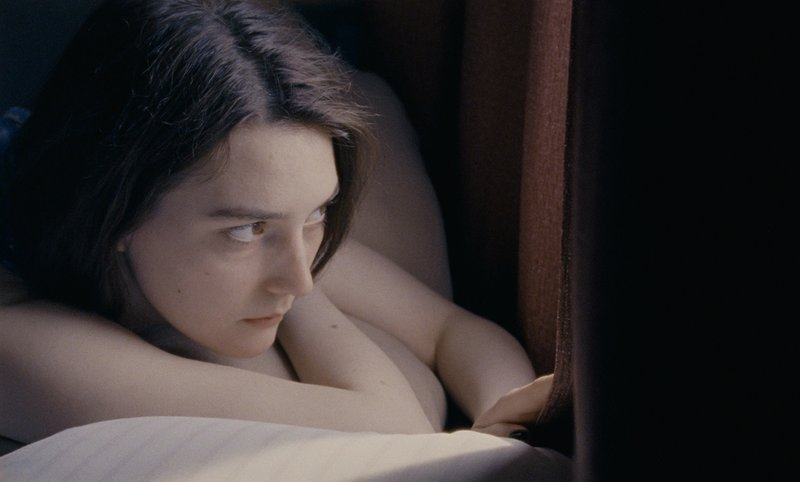PARK CITY, Utah -- It was mid-October 2017 that the #metoo movement became a national call to arms, putting oppressive, victimizing men in the crosshairs of public discourse and the law, so it makes sense that now, more than two years later, those shifting political winds would begin to reflect upon the programming of the Sundance Film Festival.
It also certainly doesn't hurt that, in recent years, the Sundance programmers took it upon themselves to greatly increase the diversity of their offerings, racially and by gender: This year, nearly half (46%) of the 118 features were directed by women.
It comes as no surprise then, that an obvious common theme to emerge from this year's slate is, essentially, the evil that men do, and from myriad angles.
We begin our tour of hellish masculinity with the bounciest entry, Janicza Bravo's Zola, based largely on a notorious 2015 tweet narrative from A'Ziah "@Zola" King. The story concerns our titular heroine (Taylour Paige), who meets a lunatic white girl, Stefani (Riley Keough), in a restaurant one night, agrees to go on a quick road trip with her down to Florida in order to dance at strip clubs to make quick bank, and gets unhappily mixed up with Stefani's peculiar entourage, her spaced-out boyfriend (Nicholas Braun), and her "roommate" X (Colman Domingo), who actually turns out to be her pimp.
As Zola spends more time with this grab bag of trashy characters, she comes to realize, to her growing horror, the miserable spot Stefani has put her in.
Refusing to turn tricks herself, but helping Stefani earn much bigger paydays, she has no choice but to bide her time until she can escape out of these lunatic clutches.
It is indeed difficult to base a feature film on a series of tweets without it coming across as anecdotal, no matter how ingenious the source, so Bravo leans in on the social media vibe, stuffing her film with indelible flourishes (the soundtrack is dominated by various phone-based sound effects, including an endless parade of Twitter chirps), and stylistic creativity. She often employs the Scorsese-approved freeze-frame-with-voiceover in describing characters, a joke that never gets old. There is a fun, ribald energy to the proceedings: Zola, surrounded by misfits, clowns and wannabe gangsters, is the lone bastion of sanity, drolly rolling her eyes at the ridiculous macho posturings of the men she has been brought into orbit with, even as she is confronted with violent danger.
Like @Zola's original tweets, Bravo doesn't go easy on male identity, with its pumped-up sense of self-protecting a tissue-thin ego (at one point, the director also employs a montage of truly horrendous male appendages to further her point). Notably, despite the lousy circumstances she has been brought into, Zola never allows herself to become a victim, a message of female empowerment that keeps the film together, even as the story gradually peters out.
Also decidedly not a victim is Cassandra (Carrie Mulligan), the heroine of Emerald Fennell's Promising Young Woman. She likes to frequent clubs in her spare time, pretending to be knock-down drunk in order to lure unsuspecting men into taking advantage of her apparent inebriation before suddenly turning the tables on them.
What that exactly means isn't always clear in Fennell's peculiar drama/romcom/revenge mashup: In the opening scene, we watch her trick one young admirer (Adam Brody) into taking her back to his place, but the only indication of her revenge is the blood spatter on the cuffs of her white blouse as she cheerily walks home the next morning (later in the film, it's indicated that whatever did happen, she didn't kill him). In another scene with another miscreant boy (Christopher Mintz-Plasse), she more or less just freaks him out and intimidates him into admitting how horrible a person he was being.
And, that, it turns out, is mostly her point. Years ago, we come to learn, she was a student in med school with her best friend, Nina. One night, Nina was sexually assaulted at a party, with the action videoed and displayed for all to see, forcing her to drop out of med school -- and Cassandra to drop out with her -- and eventually to commit suicide. Like the avenging deadshot hero from a classic Western, Cassandra's out for revenge against all predatory bros, and, in particular, anyone who contributed to her friend's untimely death.
Fortunately, this vendetta doesn't include Ryan (Bo Burnham), a haplessly charming former classmate. When they meet by chance at the coffee shop where she works, the two of them spark onto a sweet, seemingly safe romance. Still, eventually, Cassandra's mission comes back calling to her, and she sets up one last operation to settle the score once and for all.
For all its pitted anger, the film has a whiplash-inducing sense of tone, veering wildly from romantic comedy -- much of which comes from the winsome Burnham -- and violent feminist empowerment to searing drama and back again. For a movie whose opening credit sequence follows the gyrating hips of a bunch of men in khakis, rolling hideously in unflattering slow motion, actual satire is in short supply. In order to make this work, the director needs to have the pitch-perfect tone control which, at least to this point, Fennell does not possess. The premise is captivating, but this uneven hodgepodge isn't quite the film to carry it off.
If control is what impresses you, it would be well worth making time for The Killing of Two Lovers. Written and directed by Robert Machoian, it's a domestic drama about an estranged couple in rural Utah trying to find their way back together. It does not go well at first. In a whopper of an opening scene, husband David (Clayne Crawford), having snuck back into their house, holds a gun over the sleeping bodies of his wife, Nikki (Sepideh Moafi), and her lover (Chris Coy), before losing his nerve and running back to his father's house, the camera following his mad dash down the road.
Machoian's tightly wound narrative, and the precise cinematography of Oscar Ignacio Jiménez, give the film an effectively claustrophobic feel. In a later scene, as David races his truck alongside his rival in another attempt to shoot him, the camera is so fixed and tight on him inside the car's cabin, it's difficult to ascertain anything of what's going on outside his own mania. Rather than estranging the viewer, however, these exacting machinations draw us further into David's point of view.
Given the title, and David's penchant for rage-induced psychosis -- indicated, in part, by Machoian's inspired use of the sound of twisting metal and repeated car door slams in the background -- the film builds into what almost certainly seems will be a bloody climax, only to pivot in a most unexpected way. It does take pains to show how loving and devoted David is to his four children (all four of whom are Machoian's own kids), and how respectful he is with Nikki, which puts us in the curious position of rooting for him, even as we recoil from his violent rages. Any happy ending seems subject to our knowledge of what he seems capable of: In an earlier scene, his eldest child exhorts him to "fight for them." I believe she means that figuratively, but we know the literal savagery at his disposal.
There's less overt male violence in Eliza Hittman's stunning Never Rarely Sometimes Always, her third, and best film, all of which concerning teenagers' sexuality from different angles. In 2013's It Felt Like Love, a young teenage girl in Brooklyn convinces herself to pursue a callous and contemptuous boy in order to lose her virginity; Beach Rats (2017) follows the travails of another Brooklyn-based teenager, as he attempts to pursue his interest in men while continuing to maintain the facade of his bro-heteroness with his friends.
In her new film, she has moved the setting to a hardscrabble town in rural Pennsylvania, but her characters remain familiar: Autumn (Sidney Flanigan), a dour-faced high schooler has discovered to her horror that she's pregnant and too far along to get an abortion without her parents' cosign, something she wants to avoid at all costs. Enlisting the aid of her cousin, the feisty, resourceful Skylar (Talia Ryder), the pair head off to New York, where Autumn can get the procedure without her parents' knowledge.
With little money and no earthly clue about the city, the two young women are forced to endure a vagabond lifestyle, spending the nights on train platforms, or endlessly going from station stop to station stop, until Autumn can be properly treated. Hittman's eye for detail and emotional complexity -- her characters can rarely verbally articulate anything they're experiencing -- is incredibly acute, and she pulls tremendously understated performances out of her two leads.
The film is populated by an endless parade of appalling male behavior, from the jackass who shouts "slut" at Autumn as she performs a song at a school talent show, to the teens' boss at the grocery store, who grabs their hands as they fit their register envelopes through a metal slot, and plants a wet kiss on them. These men, ever-present, it seems, and always on the lookout for a potentially vulnerable moment, circle predatorily around Autumn and Skylar like tiger sharks.
In the film's most searing scene, Autumn goes through an exhaustive intake interview with a sweetly caring counselor. Shot in a long single take, the back-and-forth begins with the most basic details of Autumn's life, before eventually uncovering some of her most buried pain and trauma. Devastatingly, the camera stays fixed on her face, as she is asked to unpack at last the misery she has worked so hard to tamp down. This, then, suggests one of the more powerful and hopeful end results of the #metoo movement: No longer having to suffer in silence.
MovieStyle on 01/31/2020



